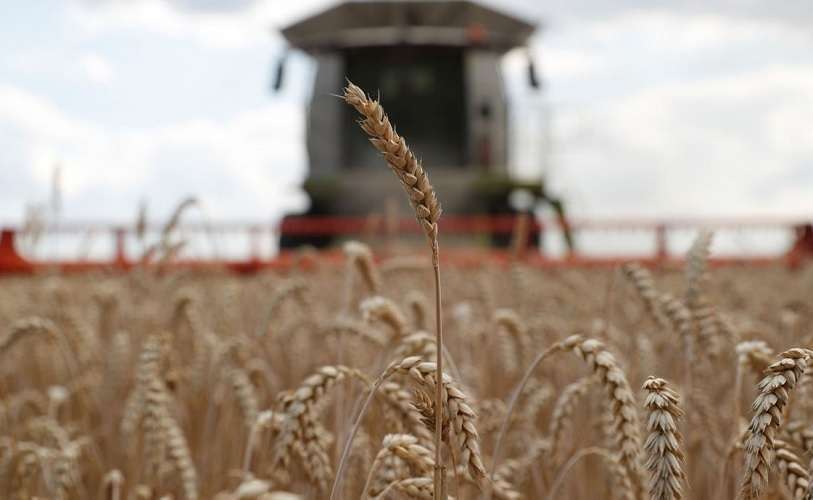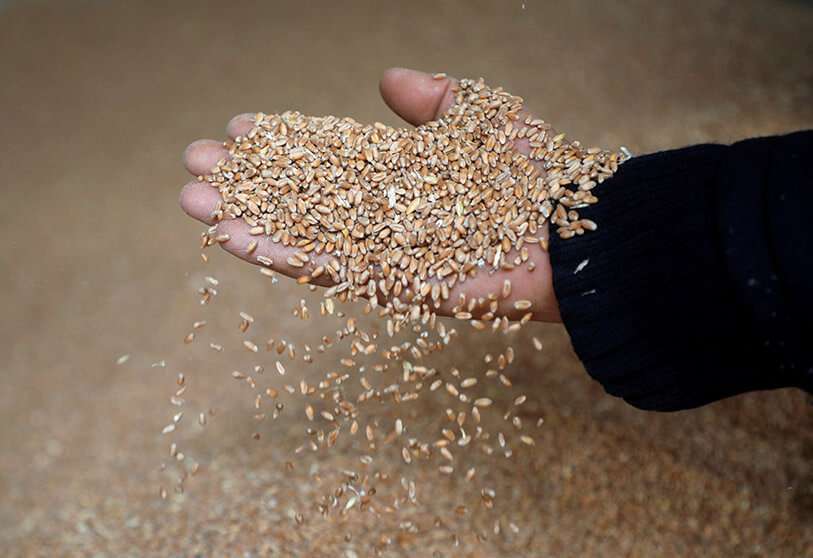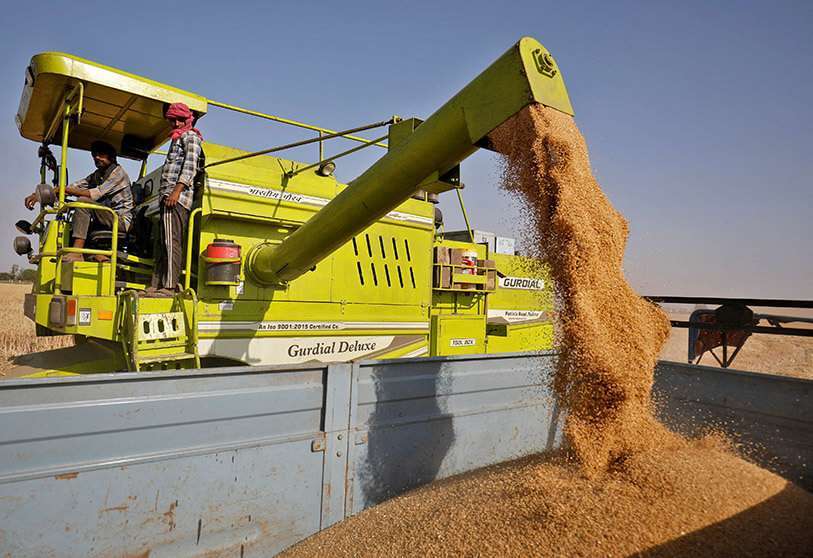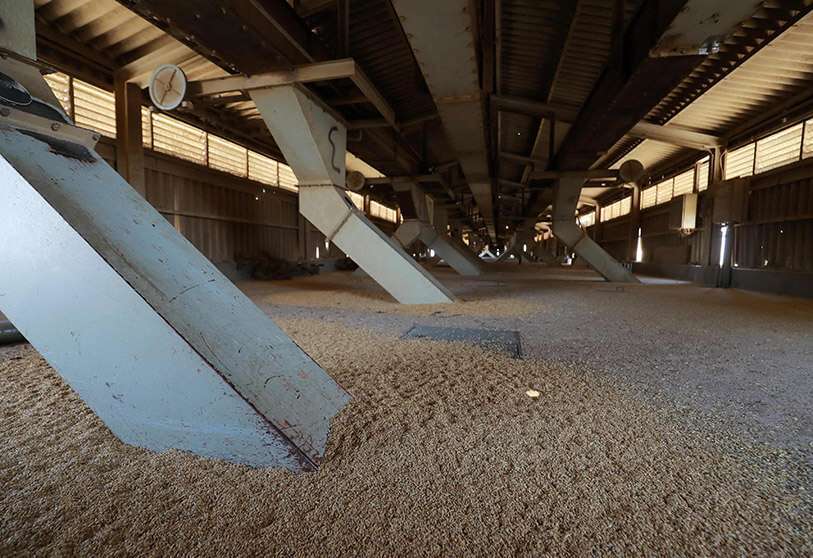
Neither Russian nor Ukrainian wheat is coming out. The former, affected by Western sanctions against Russia, and the latter, because Ukrainian ships are stranded in ports under the control of Russian troops in the Sea of Azov and the Black Sea.
Without wheat there is no bread, and without wheat Africa faces imminent famine, according to Macky Sall, leader of the African Union and president of Senegal. Concerned that a quarter of a year has passed without many African countries receiving their customary grain quotas, Sall travelled to the Russian port of Sochi for a personal meeting with the Russian dictator. The two men discussed that wheat, or any other grain, should not be used as a weapon of war.
For Putin, Western sanctions are to blame for the mess, and for Ukraine it is Russia that is boycotting the transit of grain.
The two economies sell the most grain in the world and are not doing so: the UN indicates that, between 2018 and 2020, Russia and Ukraine alone supplied 44% of the wheat consumed by Africa. One hundred days have passed since the invasion of Ukraine by Russian troops and exports from the countries involved in the war are conspicuous by their absence.

It is not only Africa that is worried about the unusual situation, but also Europe, America and Asia. The World Bank estimates that everything will depend on the duration of the war in Ukraine and how it will affect supply chains.
"The effects of the war on energy markets are clouding global growth prospects. The war in Ukraine has led to higher prices for a wide range of energy-related commodities. Higher energy prices will reduce real incomes, raise production costs, tighten financial conditions and constrain macroeconomic policy, especially in energy-importing countries," the agency says.
UN chief António Guterres speaks of a three-dimensional food, energy and financial crisis that will eventually sweep the poorest countries, the poorest economies and the poor in all countries of the world.
The UN has once again put on the table the urgent and peremptory need to reach a dialogue and peace agreement between Ukraine and Russia, while NATO chief Jens Stoltenberg incisively reiterates that "it will be a long war".

What pocketbook will be able to withstand the ravages of a long war with such ironclad sanctions over time with effects not only against Russia, but against practically the entire global village?
In three months of invasion, global inflation has risen. The Ukrainian countryside has suffered the ravages of war, one part without farmers because they are fighting on the front lines repelling Russian troops in the Donbas region; another, with silos destroyed by Russian shelling; and yet another, with ships loaded with grain rotting in containers because they cannot sail. A real disaster.
There are allegations of machinery theft by the invaders while many farmers continue to remove Russian equipment and tanks abandoned in the countryside.
There is an urgent need to let the grain out, says Amin Awad, UN Crisis Coordinator for Ukraine, who says there is no Russian or Ukrainian fertiliser or feed, and there is deep concern in many countries whose farmers and ranchers will be unable to continue their work if the situation continues any longer.

Awad explains the scale of the problem: "Around 1.5 billion people are in need of this food and fertiliser worldwide".
The first 100 days of the invasion will be over in the spring. The UN believes that the prolongation of the conflict and all the imbalances caused in raw materials will only exacerbate an autumn and winter that will be unbearable for millions of people who will be forced to live in misery, without food and energy to keep them warm.
At the moment, the intention is to get all the grain out of Ukraine by sea, and to do this it is necessary to coordinate - in times of war - that this operation can take place without bombs falling on the cargo ships.
"The five million tonnes a month is a hundred ships a month; rail or truck transport could not handle the same volume and would be fraught with logistical problems. So it really has to be a maritime movement... to export 50 to 60 million tonnes of food to the world," Awad reiterated.
There is a deterioration in the global economic outlook. Guterres himself stresses that war means hunger and that before the invasion of Ukraine, 60% of the world's undernourished people were already located in conflict territories.
"In 2021, most of the 140 million people suffering from acute hunger lived in just 10 countries: Afghanistan, Democratic Republic of Congo, Ethiopia, Haiti, Nigeria, Pakistan, South Sudan, Sudan, Syria and Yemen.
When this Council discusses conflict... it discusses hunger. And when consensus is not reached, hungry people pay a high price," he acknowledged.
Without grain, there are 44 million people in 38 countries at emergency levels of hunger and price increases of up to 30% for staple foods in Africa and the Middle East.

David Beasley, head of the World Food Programme, said the disaster was already looming because Ukraine plays a major role in the distribution of grain and other commodities.
"When a nation that is the breadbasket of the world becomes a nation with the longest bread line in the world, we know we have a problem. Even before the Ukraine crisis erupted, the world was already facing a perfect storm: the number of people marching towards starvation has soared from 80 million to 323 million, with 49 million at risk of famine in 43 countries," he lamented.
Beasley believes that the lack of food supplies will have unpredictable consequences in many countries and reiterated that the war must end as soon as possible.
What is the main problem? Beasley points out that the biggest risk comes from high commodity prices - there are many foodstuffs with skyrocketing prices; but from 2023 onwards, the biggest problem will be their scarcity, their unavailability.
"When a country like Ukraine that provides food for 400 million people is out of the market, it creates volatility in the market. When prices got out of control in 2007 and 2008 there were riots and protests in more than 40 countries; with this crisis there are already protests in Sri Lanka, Indonesia, Pakistan, Peru, Burkina Faso, Mali and Chad. And more will come," he warned.
The war in Ukraine is already in every pocket, on every dinner table, and on every electricity and petrol bill. In Beasley's view, not opening the ports in the Odessa region is a declaration of war on global food security and will unleash famine, destabilisation and mass migration around the world.
In Spain, farmers report that feeding each animal costs them 400 euros for feed, more than twice as much as before the invasion of Ukraine on 24 February.
Sara Menker, founder of Gro Intelligence, says that lack of fertiliser, climate disruption, cooking oil shortages and grain shortages will wipe out decades of progress.
"In addition, drought conditions for wheat are the worst in more than 20 years; even major breadbaskets such as the United States and Brazil are also experiencing extreme drought," she says.
Producers are looking for alternatives to the lack of sunflower oil; Ukraine is the main producer and exporter. Here in Spain, rapeseed oil is being rescued. Some countries such as Tunisia are already limiting oil, rice, flour and sugar per person.
The UK is considering sending ships into the Azov and Black Seas to escort Ukrainian cargo ships so that they can resume exports. The problem is that the sea is mined in addition to the heavy presence of Russian military vessels.
The White House is also trying to find a formula to get Ukrainian exports flowing without further delay, and from Kiev, President Zelenski proposes using the rail network; an option that the farmers themselves see as extremely expensive because on average they pay 50 euros per pallet of grain by ship, while by train the cost would be seven times higher. Unaffordable.
Antony Blinken, US Secretary of State, denounces the Kremlin's strategy of "blatant disregard" for Security Council resolution 2417 (2018), which condemns the starvation of civilians as a tool of war.
"Since 24 February, Russian naval operations have shown the intention to blockade Ukrainian ports, while on land the army is destroying Ukrainian grain storage facilities and stealing food supplies," he pointed out.
World Bank estimates speak of 20 million tonnes of grain stuck in Ukrainian silos; three more months, six months or twelve months without being on the market would have a damaging effect.
Vassily Nebenzia, Russia's ambassador to the UN, denied that his country "wants to starve" people and pointed out that threats of a global food crisis have been around for a long time.
"The problem is related to food distribution systems and not to shortages of foodstuffs. The factors, including speculation on Western food futures markets, adverse weather conditions and illegal unilateral economic sanctions are not the fault of the Russian Federation, but they have laid the foundations for the current situation on agricultural markets, although Western delegations will not mention them near the end," he vented.
A few days ago at the Davos Forum in Switzerland, European Commission President Ursula von der Leyen held Putin directly responsible for the detention of ships in Ukrainian Azov and Black Sea ports loaded with grain and other supplies that are beginning to rot.
Economic performance in 2022 depends on the course of this invasion and the collateral damage caused in the West and in commodity markets.
Mario Draghi, Italy's prime minister, spoke to Putin by telephone to mediate so that the transit of ships can be unblocked and all the exports the world is waiting for can leave.
"The purpose was to ask him if something could be done to release the grain that is currently stored in Ukraine, because the food crisis that is looming and that is already present in some African countries will have gigantic proportions and terrible humanitarian consequences," Draghi told the media.
Putin hinted that the only way to restore supplies to these stranded ships is to lift sanctions and reminded him that the ports are mined.
Why can Ukraine directly and indirectly provoke an acute global food crisis? It is the European country with the largest arable land area in Europe and the second largest in the world with a 56% share and is known as the breadbasket of Europe because it is the leading producer and exporter of maize, barley and sunflower. It is also the world's largest exporter of sunflower and sunflower oil, the second largest producer of barley globally and the fourth largest exporter of barley.
Ukraine is the world's third largest producer of maize and the fourth largest exporter; the fifth largest producer of rye and the fourth largest producer of potatoes; the fifth largest seller of wheat and other relevant inputs such as eggs, cheese and honey.





